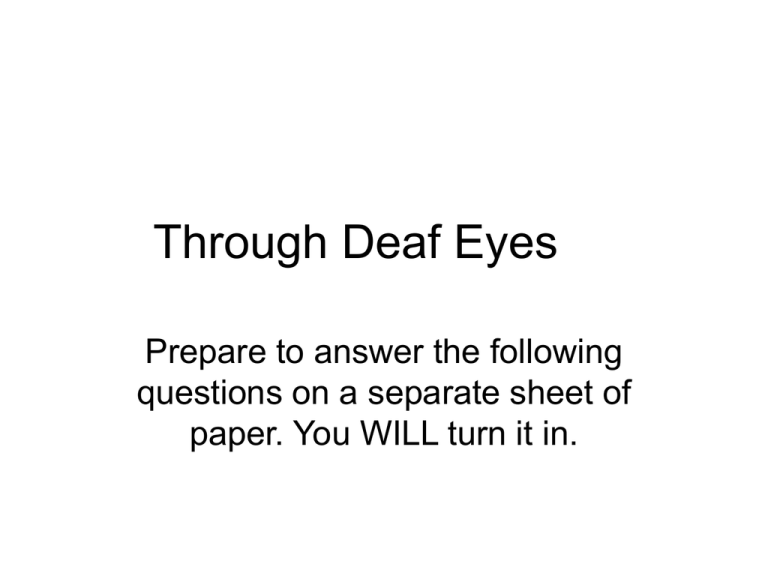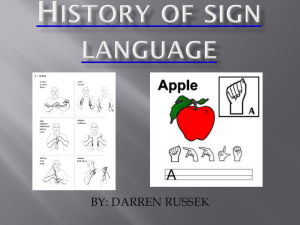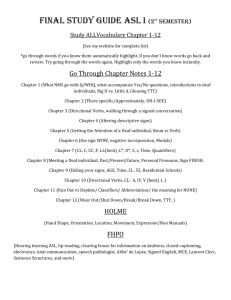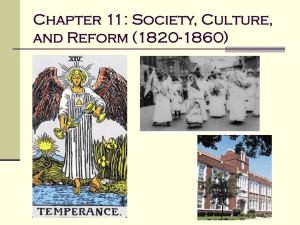Through Deaf Eyes
advertisement

Through Deaf Eyes Prepare to answer the following questions on a separate sheet of paper. You WILL turn it in. 1. What did you think of the film? 2. What stood out for you? 3. What did you learn about Deaf culture, community, and history? 4. Did the film reinforce something you already knew about the Deaf community? Explain. 5. Describe something of your experience that the film reflects. 6. Describe anything in the film that you feel might have been left unsaid Decide which of the following quotes stands out to you and copy it down. Then, write 2-3 sentences about why it stands out to you. • Marlee Matlin says: • “I’m a proud person who happens to be deaf. I don’t want to change it. I don’t want to wake up and suddenly say, ‘Oh my God, I can hear.’ That’s not my dream. It’s not my dream. I’ve been raised deaf. I’m used to the way I am. I don’t want to change it. Why would I ever want to change? Because I’m used to this, I’m happy.” • I. King Jordan says: • “When you talk to people who can hear and you ask them what do you think it would be like to be a deaf person, then all of their thinking is well, I couldn’t do this. Can’t, can’t, can’t, can’t, can’t…they would start listing all the things they can’t do. And I don’t think like that. Deaf people don’t think like that. We think about what we can do…” Decide which of the following quotes stands out to you and copy it down. Then, write 2-3 sentences about why it stands out to you. • CJ Jones says: • “What’s wrong with being deaf? I’m deaf. I’m fine. I function fine. I drive. I have a family. I’ve made a baby. I make people laugh. I travel. What the hell is going on? Like I have to hear that has nothing to do with it. It’s all about knowledge; it’s about the heart. It’s about abilities, about doing something you want and getting what you want out of life…Knowledge is the most powerful vehicle to success, not hearing, not speaking…” • Summer Crider says: • …“In terms of a disability, I don’t view myself as having a disability…I function like any other hearing person can. My deafness does not deprive me of anything. I can do anything I want. Except maybe sing.” Decide which of the following quotes stands out to you and copy it down. Then, write 2-3 sentences about why it stands out to you. • Summer Crider says: • …“In terms of a disability, I don’t view myself as having a disability…I function like any other hearing person can. My deafness does not deprive me of anything. I can do anything I want. Except maybe sing.” • David James says: • “Being deaf is, well, it’s part of me. It’s something I have to deal with, but it doesn’t keep me from being happy. It doesn’t make me either happy or say. It’s like being a man instead of a woman, or being tall instead of short.” Answer the following questions as TRUE OR FALSE 1. 2. 3. 4. 5. All deaf people use sign language. Sign language is universal. Deaf people live in a silent world. Having a deaf child is a tragedy. All deaf people would like to be cured. Please copy these sentences and write TRUE or FALSE next to each one. • Carolyn McCaskill says: • “Maybe a person can’t see and is that normal? Maybe it is. And maybe a person walks with a bit of a limp. Perhaps that’s normal to one person and not another. What about left-handedness? Is that abnormal or normal?” – a. What do these individuals’ statements suggest about common perceptions of deaf people? – b. What do these comments suggest about how deaf people view themselves in the world? – c. How do these comments strike you? – d. Do you agree or disagree with their perceptions/opinions? Explain 1. What does this “quiz” reflect? What does it imply? 2. Do these questions represent common perceptions of the deaf? Explain. 3. Does the film demystify issues related to deafness? Explain. 4. What impact did the film make on your understanding of deafness?




